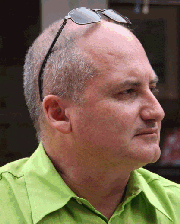SUBUD VISIONAuthor:David Week |
|

|
Mini BiographyI'm a second generation Subud member. My first memories of Subud date from the Briarcliff Congress in 1963, when I was eight years old. Two years later, we moved to Cilandak. Because I grew up in Subud, I accepted everything about Subud without question: its history, beliefs, aims and claims. But after I finished high school in Indonesia, and moved to Berkeley, I started to notice that Subud's internal reality didn't really match the reality of the world. Subud folk, I saw, often made worse decisions than others, despite claiming to have an inside line to God. And the spiritual universe sketched out in Pak Subuh's talks looked awfully similar to the universe of the religion of Java, as described by anthropologists and Javanese alike. I feel Subud has great potential. It has good people, a good and unique exercise, good intentions, high levels of religious tolerance, community, and solidarity, and a lot of dedication and commitment. I feel that if we can develop a more realistic picture of ourselves, the world, and our place in it, we have something to contribute. I currently work in the field of international development, through my consulting firm Assai. I have served in Subud as helper, group chair and councillor, and am currently the Chair of Subud Australia. |
Becoming Normal pdf, htmlNo one wants to join a cult, and no-one wants Subud to be a cult. But it's not enough to say 'we're not'. We need to follow through. This article looks at the process by which we might identify and question what is cult-like in Subud, and how we might change that. It identifies two historical sources of influence: Javanese religion, and the religious beliefs current at Coombe, as sources of much that appears cult-like. It identifies the processes that have influenced us, and considers how we might transcend these cultural influences, to become in the end more normal in terms of our own cultures. The only difference to mark us would then be (in time, and hopefully) the qualities of susila, budhi and dharma. Clear the Path to the Latihan pdf, htmlImagine a potentially interested person out there among the world's 6.5 billion people. Imagine later, that same person as a Subud member. How would that person go from A to B? This article answers: with great difficulty. Subud's only real population jump occurred at the beginning, when Subud was in the news and there was a way of finding out about it. Today, the only way to find out about Subud is if you already know the word Subud, to look for it! This article tracks the path of our imaginary interested person, the obstacles they might encounter on their way to the Latihan. What are those obstacles? Where do they come from? How might we remove them? History and Myth pdf, htmlEvery community accounts for its origins. Some of these accounts have the character of myth, others the character of history as we know it today. It's history that connects human beings, because when we trace back our histories, at some time they cross with those of other peoples and cultures. This article examines Subud's origin myth, suggests that it is not necessary to take it literally, gives an example of a possible historical origin, and then an example of how we might present ourselves if we had a history, instead of just a myth. It concludes with the suggestion that though myths have their place, what we want to find now is our place in human history. Seven Questions about Subud Culture pdf, htmlCulture is the 'tacit', unquestioned assumptions about how we behave and operate with respect to each other. Because it is rarely questioned, culture exerts a powerful influence on the shape and future of human communities. This article identifies seven attributes of Subud culture, and questions whether they serve Subud well. Subud as University pdf, htmlCommunities, like people, go through stages. The early days in Subud have much that is like high school, including the new friendships, the wild times, the belief in endless realms of possibility, in changing the world, in new ideas about how the world works, and in a favourite teacher. But high school comes to an end, and people grow up. With adult life come adult responsibilities, and things settle down. In this new stage, this article suggests that we need a new kind of Subud, one that is more like a university than it is like a high school. This university provides the opportunity for the flowering of many more views of Subud and the latihan than exist today, and through that flowering a great connection to the world and to other people. Testing the Committe pdf, htmlFour authors argue that we should change the way we elect the committee. Jointly authored with Michael Irwin, Rosalind Priestley and Sahlan Diver. To send feedback on this article click here When You Graduate pdf, htmlWhat would happen if you could graduate from Subud? Subud without Theology pdf, htmlIn this article, David ponders the question of how you might talk about Subud and the latihan to people who aren't interested in God or religion: Subud without theology. He goes on to suggest that such a way of talking might also be useful in communicating with religious people, since it wouldn't risk treading on their theology. The article takes the form of an imagined dialogue, which ends with a beer. Anwar, Anwas, and Subud Prejudice pdf, htmlCould Subud be contaminated by systematic religious prejudice?. Was Pak Subuh a Dukun? pdf, htmlSubudís connections to a traditional Indonesian role. Feedback on David's articlesTo send feedback on an article, please click on the button, next to the article synopsis, that says "Send Feedback on this article". |